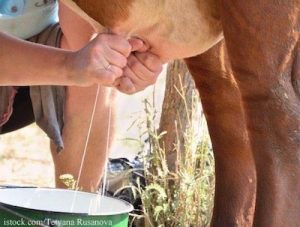The Wyoming legislature is clarifying rules about raw milk sales. That state bans commercial sale of raw milk; in fact, the law bans farm families from drinking the raw milk produced by their own cows, although that is not enforced.
The clarification reads: “producers who are the ‘sole’ owners of animals can serve raw milk in their home to family members, non-paying guests and employees of the farm or ranch.” Animal shares are considered selling raw milk and are not legal. And rules about the sales of raw milk in the state were not changed, so selling raw milk is not legal.
 The proposed bill would have allowed sales of raw milk through herd sharing, as long as a prominent warning statement, information about the standards of the farm, herd health, and results of tests performed on the animals along with an explanation of test results, were distributed along with the milk. The reselling or redistribution of the raw milk products would still be prohibited.
The proposed bill would have allowed sales of raw milk through herd sharing, as long as a prominent warning statement, information about the standards of the farm, herd health, and results of tests performed on the animals along with an explanation of test results, were distributed along with the milk. The reselling or redistribution of the raw milk products would still be prohibited.
Rep. Sue Wallis (R-Recluse) wanted to omit the word ‘sole’ from the language, which would have allowed herd or cow sharing. In those arrangements, consumers contract with a farmer to care for the cow, milk it, and bottle the product. The share owners then get the milk, but do not technically “purchase” it, which evades the laws forbidding raw milk sales.
Raw, or unpasteurized, milk is not heat-treated to kill dangerous pathogens such as E. coli, Salmonella, Listeria, Brucella, Shigella, and Campylobacter. So far in 2012, there have been five outbreaks of foodborne illness linked to raw milk consumption. As a result of those illnesses, at least six people have been hospitalized with hemolytic uremic syndrome (HUS), a complication of E. coli infections that causes kidney failure. The cost of treating HUS for a patient who dies from it can be as high as $6 million.




